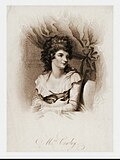| Albina, Countess Raimond | |
|---|---|
 | |
| Written by | Hannah Cowley |
| Date premiered | 31 July 1779 |
| Place premiered | Theatre Royal, Haymarket, London |
| Original language | English |
| Genre | Tragedy |
Albina, Countess Raimond is a 1779 tragedy by the British playwright Hannah Cowley. [1] It premiered at the Theatre Royal, Haymarket in London 31 July 1779. [2] The original cast included Howard Usher as King Henry, West Digges as Westmoreland, William Wyatt Dimond as Edward, James Aickin as Egbert, Robert Palmer as Oswald, John Gardner as Steward and Katherine Sherry as Albina. She dedicated the play to the politician Lord Harrowby.
